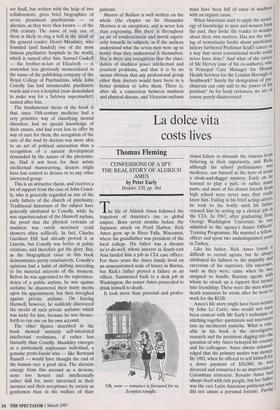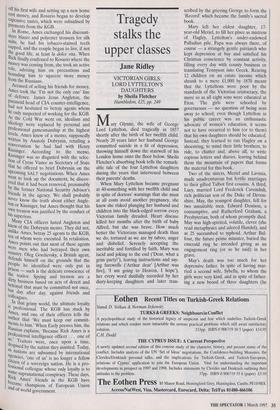La dolce vita costs lives
Thomas Fleming
CONFESSIONS OF A SPY: THE REAL STORY OF ALDRICH AMES by Peter Early Hodder, £20, pp. 364 The life of Aldrich Ames followed the trajectory of America's rise to global empire. Born seven months before the Japanese attack on Pearl Harbor, Rick Ames grew up in River Falls, Wisconsin, where his grandfather was president of the local college. His father was a dreamy ne'er-do-well, whose interest in South-east Asia landed him a job as CIA case officer. For three years the Ames family lived on an unaccustomed scale of luxury in Burma, but Rick's father proved a failure as an officer. Summoned back to a desk job in Washington, the senior Ames proceeded to drink himself to death.
It took more than personal and profes- `Oh, wow — romance is favoured for us Scorpios tonight.' sional failure to dissuade the Ameses from believing in their superiority, and Rick, although his school performance was mediocre, saw himself as the hero of many a cloak-and-dagger mystery. Early on he learned to play a part, or rather many parts, and most of his closest friends from high school were never sure they reallY knew him. Failing in his brief acting career, he took to the bottle until his father rescued him by setting up a clerical job in the CIA. In 1967, after graduating from George Washington University, he was admitted to the agency's Junior Officers Training Programme. He married a fellow- officer and spent two undistinguished years in Turkey. Like his father, Rick Ames found it difficult to recruit agents, but he alwaYs, attributed his failures to the stupidity and careerism of his superiors. His successes, such as they were, came when he was assigned to handle Russian agents with whom he struck up a rapport that turned into friendship. These were the men whose death sentences he wrote after he went to work for the KGB. Ames's life story might have been written by John Le Carre, who would not have been content with Mr Early's technique of stitching together quotations and interviews into an incoherent pastiche. What is valu- able in his book is the investigative research and the persistent digging into the question of why Ames betrayed his countrY and his colleagues. Ames always acknowl- edged that the primary motive was money' By 1985, when he offered to sell himself for a down payment of $50,000, he was divorced and remarried to an impoverisheu. Colombian aristocrat. Rosario Ames had always lived with rich people, but her father was the rare Latin American politician who did not amass a personal fortune. Paying off his first wife and setting up a new home cost money, and Rosario began to develop expensive tastes, which were subsidised by payments from the KGB.
In Rome, Ames exchanged his discount- store blazer and polyester trousers for silk suits; he had his tobacco-stained teeth capped, and the couple began to live, if not the good life, at least la dolce vita. When Rick finally confessed to Rosario where the money was coming from, she took an active role, advising him on precautions and hounding him to squeeze more money from the Russians.
Accused of selling his friends for money, Ames took the 'I'm not the only one' line of defence. James Jesus Angleton, the paranoid head of CIA counter-intelligence, had not hesitated to betray agents whom he only suspected of working for the KGB. As the Cold War went on, idealism and Ideology were replaced by personal and professional gamesmanship at the highest levels. Ames knew of a memo, supposedly written by Anatoly Dobrynin, retailing a conversation he had had with Henry Kissinger. According to the memo, Kissinger was so disgusted with the selec- tion of Cyrus Vance as Secretary of State Mat he offered to brief Dobrynin on the upcoming SALT negotiations. When Ames Went to look up the document, he discov- ered that it had been removed, presumably by the former National Security Advisor's friends in the agency. We shall probably never know the truth about either Angle- ton or Kissinger, but Ames thought that his n treason was justified by the conduct of his superiors.
Many CIA officers hated Anton an and of the Dobrynin memo. Thgeyle did not,d unlike Ames, betray 25 agents to the KGB, ten of whom were executed. In retaliation, Ames points out that most of these agents were men who had betrayed their own country. Oleg Gordievsky, a British agent, defends himself on the grounds that the People he identified were only put in Prison — such is the delicate conscience of the traitor. Spying and treason are a dirty business based on acts of deceit and betrayal that must be committed not once, but day after day, against friends and colleagues. In that grimy world, the ultimate loyalty is Professional. The KGB has stuck by Amex, and one of their officers tells the author that 'We must keep our commit- ments to him.' When Early presses him, the Russian explains, 'Because Rick Ames is a Professional intelligence officer . . . one of us. Traitors were, once upon a time, despised by the nation they assisted. Today, as nations are subsumed by international agencies, 'one of us' is no longer a fellow citizen of a sovereign nation. He is a pro- fessional colleague whose only loyalty is to some supranational conspiracy. These days, bck Ames' friends in the KGB have eome champions of European Union and of world government.



























































 Previous page
Previous page